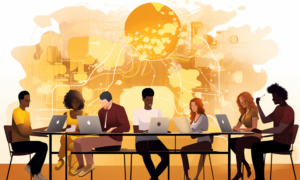Microsoft's Rebecca Winter: HR makes the biggest difference by addressing skills gaps
- 9 Min Read
Microsoft talent management director for EMEA and Asia Rebecca Winter explains how HR can build a business which is in the middle of a major change process.
- Author: HRD Connect
- Date published: Nov 16, 2016
- Categories
Microsoft Talent Management Director for EMEA and Asia Rebecca Winter explains how HR can build a  business which is in the middle of a major change process.
business which is in the middle of a major change process.
She also reveals how massive shifts in the nature of work will create pressures and new demands for talent, and how HR professionals can embrace new ways of thinking and decision-making.
Winter was speaking to HRD Connect ahead of her session at the HRD Summit 2017.
What is the biggest challenge and opportunity facing the HR profession right now?
The headline here is how the nature of work is changing.
Its most relevant dimension for me is what my HRD Summit session will cover: the majority of the time, many leaders have to function in completely ambiguous environments that change frequently.
Digital Transformation in the market is accelerating exponentially. As a result, many organizations that serve customers’ digital needs are transforming equally quickly – both the shape of their business, and the internal organizational structures and processes as well. How do we prepare leaders to lead in such ambiguous environments, manage their ‘state’ from a physiological perspective, and continue to make wise decisions?
There is a second dimension related to the changing nature of work that also captures my attention. And that is the skills gap that’s going to come from the automation of work. Among many other things, we will be looking at how technology can change how we look at development and assessment. This is a big topic of reflection for Microsoft, especially as we’ve just purchased LinkedIn.
What is likely to have the biggest effect on the work of your HR team: business strategy or government policy?
For the moment, it’s still business strategy. With that said, every time there is a transition of power in the US, it can open the door to policy driving large changes. But that is yet to be seen with the recent Presidential election.
Our business is changing very rapidly; the whole shape of the business and the strategy has been deeply in flux since Satya Nadella stepped into the role of CEO. Leadership changes, new blueprints and roles and connection points and new relationships all come along with this.
It is changing massively across the company, a couple of times a year now.
Government policy affects what we do, but it’s a drop in the bucket. 2017 could change that, so let’s see how the election and phenomenon like Brexit drive changes over time.
Where can HR make the biggest difference in your organisation?
Without a doubt, HR has a huge role to play at Microsoft and it’s really exciting. The impact we are asked to have is enormous – Satya sees that impact as essential to the company’s success with their mission and strategy – I feel like there has never been a more exciting time for us in HR. Key focus points for folks in the HR Leadership roles include:
1) Our leaders – Supporting the business to shape leaders who will thrive in the digital economy by creating clarity, generating energy, and delivering success.
2) Stewarding our culture by:
a. Making an impact on diversity, inclusion, and embracing the concept of belonging;
b. Bringing the growth mindset alive;
c. Ensuring that the customer is at the centre of everything we do;
d. Working with the company to continually reshape the way we collaborate and go to market.
Day to day, for my role in particular, I think a lot about the leadership piece: building resilience and agility in our leadership population with things like organising rotational tours of duty and better on-boarding, because we’re going to have people doing jobs that they’ve never done before.
I think about how we help our leaders take care of themselves – people thrive off their energy, and we need them to build resonance into our organisations.
We need new learning capabilities, including on-demand and “just in time” learning, for jobs that will be coming online, not just jobs that are already here.
So much has to be built on the job; what are the skills that you’re looking for?
Perhaps it’s this notion of values and attitude and motivation. We’re not looking for the person to have this perfect degree, qualification and work history, but things like failed start-up experiences, doing really different things and keeping going – we’re looking for different things.
HR has to lead the way to define that for the company and ensure that’s what we’re pulling from the market. It’s not HR doing the hiring; the business is doing the hiring. We may bring the candidates to the table, but we also have to work with the people making the decisions; we have a huge education and enablement effort afoot.
Just because we understand what needs to be done doesn’t mean that your interviewer line-up is going to have that depth of understanding and nuanced ability to pick out the right person.
How important is it for leaders to be open to new ways of thinking?
Of course it’s very important.
It goes without saying that we need people to be open to new ways of thinking about the market and world, but frankly also about themselves.
Our company and a number of others have embraced Carol Dweck’s work on Growth Mindset, so this notion of being able to say ‘I screwed up and learned from it’ in a very traditional scorecard culture is not easy. It’s also about not having all the answers, being able to look at themselves and admitting they are not good at that and need help, or acknowledging something is a risk.
Having people who can stand up and say that and do that knowing that’s what expected of them – we need to reward people who do that.
The company has to find ways of rewarding the culture that we’re seeking to inculcate, so we can’t just say ‘You’re a leader, you need to think differently’ – we need to connect it too.
I have a lot of hope that we will succeed here, however, as Satya sets this example brilliantly from the top. He never misses an opportunity to consistently deliver the message on the this new way of thinking – and I have seen quite a bit of change in our culture over the last couple of years, in spite of having a ways still to go. But in the end, it will be the company’s results that will speak to this change.
How can coaching help leaders make major business-critical decisions?
It’s critical to include coaching, but it’s not the only thing that should be included. The environment we work in is enormously volatile.
Things like effective stress management as well as using the full range of your head, heart and gut can be key performance differentiators – there is a whole body of research linking the use of intuition and other ‘unconscious’ forms of intelligence to things like a leader’s success and ultimately a company’s financial performance.
So coaching is not the only lever, but it is a critical lever to support leaders on some of these developments. Unless a leader is enormously resilient, it’s not always easy to activate these things on your own in the middle of everything going on – you need a mirror. It would take an enormously wise person to do that for themselves all the time.
External coaching as well as coaching via a HR business partner can help keep a leader aligned, so they can be the wisest expression of themselves and make the best decisions for their business.
In an increasingly evidence-based world, is it possible and relevant to connect with people’s emotional and physical states?
It’s absolutely relevant. For example – there is no decision that gets made that is purely ‘rational’. We might like to think that we are rational, logical beings, but the science says otherwise.
If you cut your awareness off from what is going on with you emotionally and physically, you risk functioning at a much lower level. The research tells us that wise decision-making requires integration of both intuitive and rational processes. What we know from the neuroscience is that intuition has a pattern based structure, which is not irrational; it has a rational basis, it’s just non-conscious.
The research also tells us that people with greater interoceptive awareness make wiser decisions. This means that they have greater sensory awareness of things like their own heartbeat. Imagine that! Research has also shown us that without fail, decisions are often made before they appear as a conscious thought to a person. So if we have you hooked up to a bunch of electrodes and focused on a decision-making task, we could tell what you were going to do 4 to 10 seconds before you ‘made the decision’ yourself.
So much of that decision making happens on an ‘unconscious’ level before a subject is consciously aware. The decision making centre in your brain – the pre-frontal cortex – has channel constraints and can only do so much at once. A lot of ‘pre-work’ goes on with other neural circuitry in your body.
Therefore, if we want to be evidence-based, it’s quite clear we need to learn how to apply the latest neuroscience so leaders know how to effectively bootstrap their different ways of knowing.
The evidence is there in spades about the importance of what’s happening outside your conscious rational processing – it just doesn’t all show up as a conscious thought in your brain at that time.









